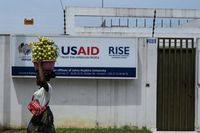Seoul, April 17 (Yonhap) -- South Korea's official development assistance (ODA) to developing countries surged by 24.8% last year, reaching an impressive $3.94 billion, according to a government announcement made today. This increase marks a significant rise of $780 million compared to 2023, reflecting South Korea's growing commitment to international aid.
According to preliminary data from the Development Assistance Committee (DAC) of the Organisation for Economic Co-operation and Development (OECD), South Korea's assistance as a percentage of its gross national income hit 0.21%, the highest rate since the country joined the DAC in 2010. This uptick in aid is largely attributed to a 37% increase in bilateral assistance, which totaled $3.18 billion. This amount included $2.22 billion in grants and $960 million in concessional loans.
Multilateral assistance accounted for $760 million of the total, showcasing South Korea's diverse approach to development aid. Among the 32 member countries of the DAC, South Korea ranked 13th in terms of total official development assistance, moving up one position from 2023.
The government has allocated 6.5 trillion won for official development assistance this year, representing a 3.8% increase compared to 2024. This funding is part of South Korea's strategic goal to become one of the top 10 donor countries globally.
In contrast, the OECD recently expressed "fears" about the future of global development assistance, noting a decline for the first time in six years. In 2024, official development assistance worldwide dropped to $212.1 billion, a decrease of 7.1% from the previous year. The OECD's report highlighted that some countries, including the United States, France, and Britain, have announced cuts in their development assistance budgets, raising concerns over the sustainability of aid levels.
The OECD projected that global development assistance could decline by between 9% and 17% from 2024 to 2025. This anticipated drop comes amidst increasing international crises and diminishing public resources available for aid.
Particularly impacted by these cuts is aid directed towards Ukraine, which saw a significant reduction of 16.7% in 2024. The OECD noted that assistance to Ukraine decreased to approximately $15.5 billion, following a surge in aid from $918 million to $16 billion between 2021 and 2022 in response to the Russian invasion.
Despite the downturn in 2024, the OECD emphasized that global development assistance remains about four times higher than its levels in 2019, indicating a broader trend of increasing aid prior to the recent cuts.
As South Korea continues to bolster its development assistance, the government remains focused on addressing global challenges and supporting vulnerable populations. The rise in aid reflects a commitment to enhancing international cooperation and fostering sustainable development.
In addition to financial contributions, South Korea is also investing in educational initiatives, offering academic scholarships for foreign ministry diplomats, and engaging in partnerships with countries like the UAE, where recent cooperation agreements in the field of KF-21 fighter jets were signed.
In the context of regional diplomacy, a South Korean delegation recently visited the UAE to support the country's participation in limited structural projects, further solidifying ties between the two nations.
As the landscape of international aid evolves, South Korea's proactive approach to development assistance positions it as a key player among donor countries. The government’s strategic funding allocations and partnerships reflect a commitment to addressing pressing global issues while enhancing its role on the world stage.
In summary, while South Korea is making strides in its development assistance efforts, the global outlook for aid remains uncertain, with many countries reevaluating their commitments amidst economic challenges. The need for sustained and increased support for developing nations is more critical than ever as the world faces complex challenges that require collaborative solutions.




